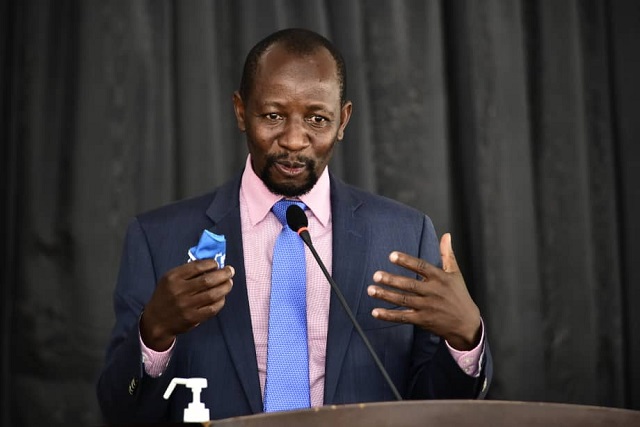
Ssemujju says that there are many people within the opposition who are only there just in name but in spirit they belong to the ruling NRM
Kampala, Uganda | THE INDEPENDENT | In 2011, Nathan Nandala Mafabi, the MP for Budadiri West and also a member of the Forum for Democratic Change (FDC) contested for the position of Speaker of Parliament, but lost to now former Speaker Rebecca Kadaga.
Mafabi garnered 57 votes against Kadaga’s 302. Similarly, Samuel Odongo Otto, now former MP for Aruu county challenged Jacob Oulanyah for the position of deputy speaker. Otto scored 58 votes against Oulanyah’s 299 votes.
First forward in 2016, Muhammad Nsereko, an independent MP representing Kampala Central challenged Oulanyah for the position of deputy speaker and scored 115 votes against the now speaker of parliament’s 300 votes. In the 2011 elections, the two opposition candidates scored the exact number of votes as the number of opposition leaning MPs who were in parliament then.
But the 2016 election surprised many when Nsereko scored more votes than the seats that all the opposition parties held. At least more than 45 NRM MPs defied their party and voted for Nsereko who was assumed to be more opposition leaning after dumping the ruling party in that year’s election.
The events of 2011 and 2016 are a direct contrast to what transpired in parliament on Monday as MPs voted for the speaker and deputy speaker. For the speaker race, Ssemujju Ibrahim Nganda, the immediate former opposition chief whip was contesting against two candidates both members of the NRM. Jacob Oulanyah, the official candidate of the party and Rebecca Kadaga who defied her party to contest as an independent. Oulanyah carried the day with 310 votes against Kadaga’s 197 votes. Ssemujju only managed a paltry 15 votes. For the post of deputy speaker, NRM’s Anita Among, the Bukedea woman MP who was the victor scored 415 votes against 35 of Yusuf Nsibambi (Mawokota South) of the FDC and 24 of Muhammad Nsereko.
These scores especially for Among left a bad taste in the mouths of a number of political players who wondered why the opposition chose to vote for an NRM candidate. Collectively, opposition political parties control 109 parliamentary seats. Assuming all those who belong to the opposition voted for either Nsereko or Nsibambi, it means 50 other MPs of the opposition voted for Among. This reality rattled Ssemujju who in an interview with Uganda Radio Network accused some MPs on the opposition side for accepting bribes from Among.
But away from the finger pointing, the acrimony witnessed on Monday shades light on the days ahead as parliament takes shape. Ssemujju told URN that there are many people within the opposition who are only there just in name but in spirit they belong to the ruling NRM.
Ssemujju said however, if the opposition’s main aim is to end President Yoweri Kaguta Museveni’s rule, then they have no option but to work together. He said it will take some time for the wounds from the speakership race to heal but as they do, there must be a deliberate effort to sit and iron out their differences.
Joel Ssenyonyi, the spokesperson of the National Unity Platform who is also the MP for Nakawa West too recognized the need to work together if they are to hold the government accountable. Ssenyonyi said his party has tried to reach out to other opposition political players but they have been met with resistance.
“There should be a deliberate effort on working together and without a doubt, we are stronger as a group than as individual political parties. As NUP, we shall continue reaching out to other political parties in order to have a common ground on especially things that unite us,” said Ssenyonyi. The MP for Makindye East Derrick Nyeko however said for this to happen, parties especially the FDC must accept that there is currently another player on the political block.
For Asuman Basalirwa [Bugiri municipality], the sole MP for Jeema, says what is disturbing the opposition are egos between the two leading parties, FDC and NUP. Basalirwa who supported Kadaga for speakership added that parties must wake up to the reality that the only way they can impact people’s lives is by having a united front.
Basalirwa also said it would be hypocritical for the public to blame parties for not talking yet its them who fuel this disunity. He added that if the public was interested in a united front, they shouldn’t take sides when there is a disagreement between parties.
For his part, Dr. Sam Kazibwe, a political commentator and senior lecturer at Uganda Christian University says it wouldn’t be fatal for parties to have different agendas and wanting to implement them independently. The only worry for Kazibwe is that all the six opposition parties with MPs seem not to be knowing how they want to challenge President Museveni.
Kazibwe admits that it will not be easy for FDC who have led the opposition for the last 15 years to accept NUP as the new leaders especially with the biggest majority of their members [NUP] being novices in politics. However, he adds that failing to agree on the basics might gift President Museveni with the political peace and tranquility he has been longing for years.
“Having a multiplicity of powerful opposition parties is not actually a problem and people are free to choose where to belong. But the question is; how do you balance your interests as a party and those of the wider public?” Kazibwe said. NUP is expected to name the leaders in Parliament either before the end of this week or at the beginning of next week.
*****
URN
The post Can the Opposition unite after the acrimonious speaker election? appeared first on The Independent Uganda:.
from The Independent Uganda: https://ift.tt/34jYyjC
0 Comments